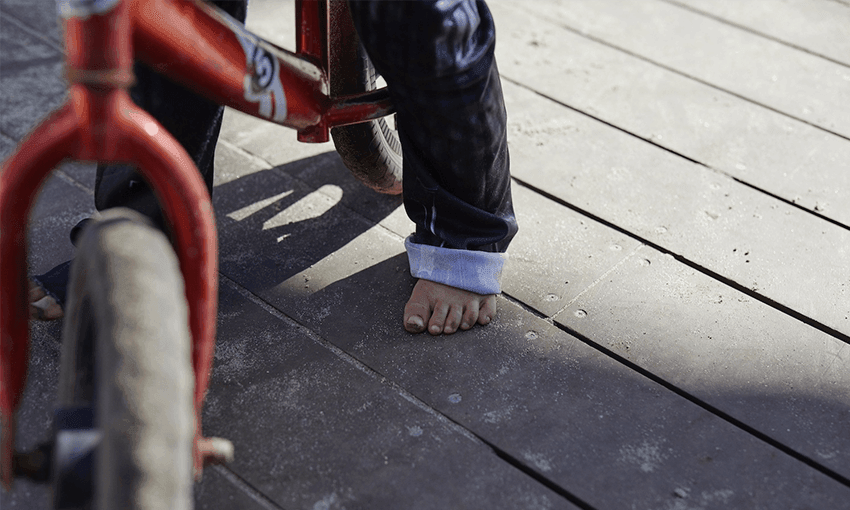Early childhood is an intensely vulnerable time. As families struggle with the cost of living, under-fives are bearing the impact – without many of the supports available to their older siblings. Naomii Seah reports.
“We have a single dad who comes in with his daughter – it’s obvious he loves her to bits – but we’ll see that her clothing might be too small, and she comes without enough nutritional food. It’s not filling her up, and the day will be a struggle for her.
“It’s really sad what’s happening out here. It’s heartbreaking. I’d never experienced anything like it in my life.”
Jane* is the head kaiako at an early childhood education (ECE) centre in small-town New Zealand. Hers is one of many ECEs across the country reporting an increase in food insecurity, as more children arrive without a full lunch box.
The town’s community faces high unemployment, intergenerational poverty and crowded housing. For the children – school students and preschoolers alike – these challenges manifest in near-continual illness, substandard nutrition and poor health outcomes.
Jane says the need is huge, and the centre’s resources are stretched thin. Her centre is currently on the waitlist for support from charity KidsCan, which provides clothing and food for children in hardship.
Jane isn’t alone. In an urban ECE, centre manager Sarah* tells of grandparents on superannuation who were struggling to raise their mokopuna. She realised the depth of their need when she saw the grandfather begging outside the local supermarket. Sarah helped him with groceries that week, but she describes the experience as “a real eye opener”.
“It broke my heart to know that one of my families was struggling to that extent.”
The first 1000 days
Research shows that the first thousand days of an infant’s development are crucial for life course outcomes, making ECE an important vector for interventions aimed at addressing child poverty.
During this time the brain is growing rapidly. When babies are born, their brains are around a quarter of an adult’s size; by the time they are five, a child’s brain is 90% as large as an adult’s.
Adequate nutrition during early childhood is crucial for cognitive development and future learning, motor function and social and emotional skills. A poor diet and the stress of hunger can impact a child for life.
KidsCan has been supporting ECE centres since 2019, making it the first charity of its kind to provide support specifically targeted at preschoolers. “We know that children who experience food insecurity, especially from a young age, go on to have poorer health outcomes,” KidsCan CEO Julie Chapman says.
“These are the brothers and sisters of kids that we help in schools, so it made sense to make a programme available to them.”
Support includes a morning tea and lunch programme designed in collaboration with the Heart Foundation. Every eight weeks, centre managers order meals from a range of recipes, and each week fresh ingredients are delivered for preparation. Every child also receives a warm jacket, shoes and socks, and gumboots.
Centres supported by KidsCan say that their lunches may be the only nutritious meal some children receive in a day. That means the programme is also an important introduction to good eating habits. Centres are sharing their Heart Foundation recipes with whānau because the children love the food so much, says Chapman.
“One of the cool things about the programme is that kids are trying foods they wouldn’t have access to,” says Chapman. “In particular the fruit component is highly valued. They love it.
“It’s an equaliser for kids; they’re all sitting together for lunch and have this awesome food dished up to them.”
Currently, KidsCan is able to support 6000 children, but there are over 150 centres still on the waiting list. Chapman says that need has surged with the cost of living crisis.
This is the time when lifelong food habits and nutritional intakes are established, says Chapman. “So it’s super important that we can reach as many kids as possible under five who need that nutritional support, and warm jackets and shoes, too.”
A world of difference
One immediate consequence of poor nutrition for toddlers is poor behaviour. It’s a reality that Sarah, the urban ECE manager, knows well.
“One of our biggest challenges was children’s behaviour. The quality of food that was coming in with lunch boxes definitely had an impact on how the children behaved throughout the day.”
Sarah’s centre started receiving KidsCan’s support in 2020. The impact was like night and day, she says. “We’ve seen our children are now so much more settled, they’re able to learn, they’re able to engage, they want to be here.”
Since the KidsCan support began, attendance has become consistently high and its waiting list has grown.
Sarah says that support was crucial to the grandfather she found begging for food. His mokopuna were there every day, and it helped him hugely to know his grandchildren were fed at the centre.
With the basics covered by KidsCan, the ECE can make a real difference to tamariki. “We’re at a point where we can actually help the children to learn; to be successful with their transition into school.”
Jane’s centre is doing all it can to support families too. They fund a breakfast club and provide extra lunch for children who don’t have enough.It’s a huge weight off many whānau, says Jane. But it means resources are diverted from learning resources.
KidsCan support would mean the world. “We’re all about supporting children to be able to attend and keep healthy,” she says. “These children need that support; they deserve that support.”
* Names have been changed.

